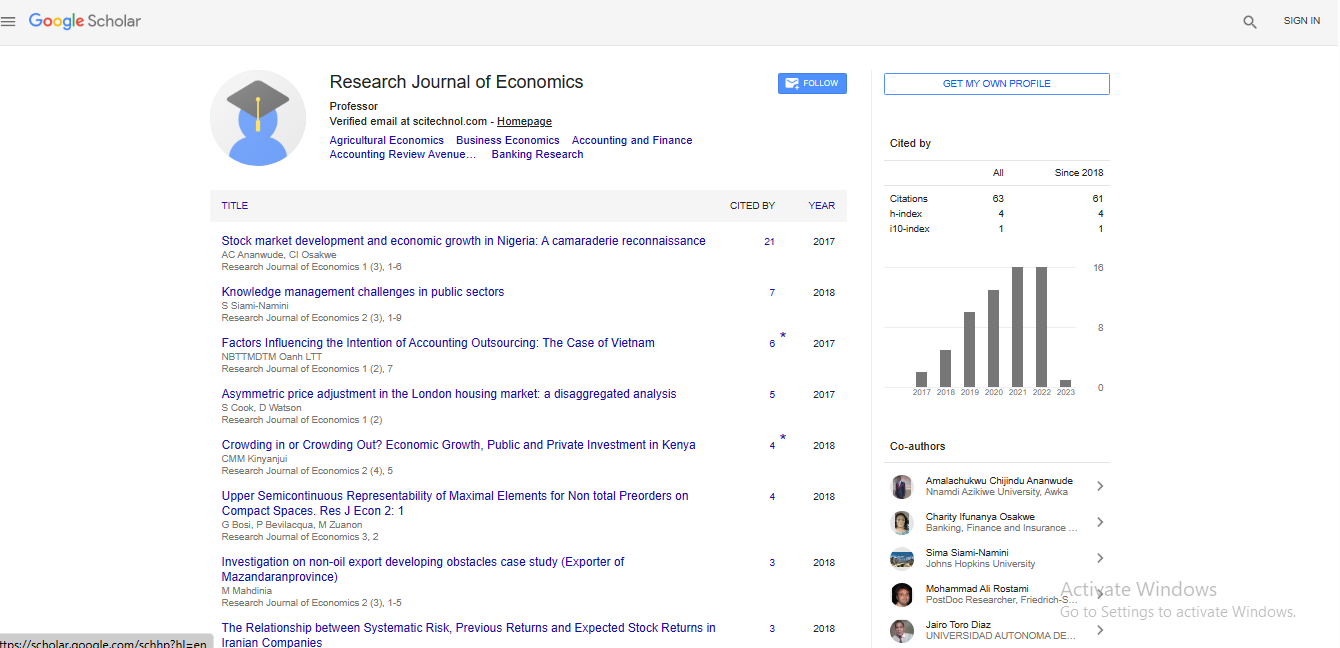Short Communication, Res J Econ Vol: 7 Issue: 5
Avenues of Investment: Diversifying Your Financial Portfolio
Abdul Bernal*
1 Department of Economics, Pontifical Catholic University of Peru, Lima, Peru
*Corresponding Author: Abdul Bernal,
Department of Economics, Pontifical
Catholic University of Peru, Lima, Peru
E-mail: bernalabdul09@edu.pe
Received date: 01 September, 2023, Manuscript No. RJE-23-117591;
Editor assigned date: 04 September, 2023, PreQC No. RJE-23-117591 (PQ);
Reviewed date: 18 September, 2023, QC No. RJE-23-117591;
Revised date: 25 September, 2023, Manuscript No. RJE-23-117591 (R);
Published date: 02 October, 2023 DOI: 10.4172/RJE.1000170
Citation: Bernal A (2023) Avenues of Investment: Diversifying Your Financial Portfolio. Res J Econ 7:5.
Description
Investment is the process of allocating funds with the expectation of generating returns or profits over time. It is an essential aspect of personal finance and wealth management. Effective investment strategies can help individuals build wealth, achieve financial goals, and protect against inflation and economic uncertainties. There are numerous avenues of investment available, each with its own riskreward profile and potential for growth.
Equities (Stocks)
Equities, commonly referred to as stocks, represent ownership shares in a company. When you buy stocks, you become a partial owner of the company, and your returns are tied to the company's performance. Investing in equities can be done through individual stocks or Exchange-Traded Funds (ETFs). The stock market can be volatile, but historically, it has shown considerable long-term growth potential, making it a popular avenue of investment for those seeking higher returns.
Bonds
Bonds are debt securities issued by governments, municipalities, or corporations to raise capital. When you purchase a bond, you are essentially lending money to the issuer in exchange for periodic interest payments and the return of the principal amount at maturity. Bonds are considered a relatively safer investment compared to equities, as they offer more stable returns. However, their returns are typically lower than those of stocks.
Real estate
Real estate investments involve purchasing properties (e.g., residential, commercial, or industrial) with the expectation of generating rental income or capital appreciation. Real estate can be an attractive investment avenue due to its potential for passive income, tax benefits, and as a hedge against inflation. However, it requires careful research, management, and can be illiquid.
Mutual funds
Mutual funds pool money from multiple investors to invest in a diversified portfolio of stocks, bonds, or other securities. Professional fund managers handle the investment decisions, making it an accessible option for individuals looking for professional management and diversification without directly purchasing individual assets. Mutual funds come in various types, including equity funds, bond funds, and balanced funds.
Exchange-Traded Funds (ETFs)
ETFs are similar to mutual funds but are traded on stock exchanges like individual stocks. They offer diversification, lower expense ratios, and intraday trading opportunities. ETFs can track various indices or specific sectors, providing investors with exposure to a wide range of assets.
Commodities
Commodities include physical goods such as gold, silver, oil, agricultural products, etc. Investing in commodities can be done directly through physical ownership or indirectly through commoditybased mutual funds or ETFs. Commodities can serve as a hedge against inflation and currency fluctuations but can also be volatile.
Diversifying our investment portfolio across multiple avenues is important for managing risk and maximizing returns. The selection of investment avenues should align with your financial goals, risk tolerance, and time horizon. It is advisable to seek advice from financial experts and conduct thorough research before committing funds to any investment. By understanding the different avenues of investment and their unique characteristics, investors can make informed decisions and work towards achieving their financial objectives. Remember, every investment carries some level of risk, and diversification remains one of the key strategies to mitigate potential losses while seeking long-term growth.
References
- Madon S (2000) The Internet and socio‐economic development: Exploring the interaction. Inf Technol People.
[Crossref]
- Adebayo TS, Agboola MO, Rjoub H, Adeshola I, Agyekum EB, et al. (2021) Linking economic growth, urbanization, and environmental degradation in China: What is the role of hydroelectricity consumption? Int J Environ Health Res 18(13): 6975.
- Bussolo M, De Hoyos R, Medvedev D (2008) Economic growth and income distribution: Linking macroeconomic models with household survey data at the global level. IARIW. 24-30.
- Farinha L, Ferreira JJ, Nunes S (2018) Linking innovation and entrepreneurship to economic growth. J Int Bus Stud.
- Kania‐Lundholm M (2014) Nation in market times: Connecting the national and the commercial. A research overview. Sociol Compass 8(6):603-13.
- Gould DM (2018) Critical connections: Promoting economic growth and resilience in Europe and Central Asia. World Bank Res Obs.
- Henderson J, Dicken P, Hess M, Coe N, Yeung HW (2002) Global production networks and the analysis of economic development. RIPE 9(3):436-64.
- Bowen J (2000) Airline hubs in Southeast Asia: National economic development and nodal accessibility. J Transp Geogr 8(1):25-41.
- Swilling M, Nygaard I, Kruger W, Wlokas H, Jhetam T, et al., (2022) Linking the energy transition and economic development: A framework for analysis of energy transitions in the global South. ERSS 90:102567.
- Kruss G, McGrath S, Petersen IH, Gastrow M (2015) Higher education and economic development: The importance of building technological capabilities. Int J Educ Dev 43:22-31.
 Spanish
Spanish  Chinese
Chinese  Russian
Russian  German
German  French
French  Japanese
Japanese  Portuguese
Portuguese  Hindi
Hindi 